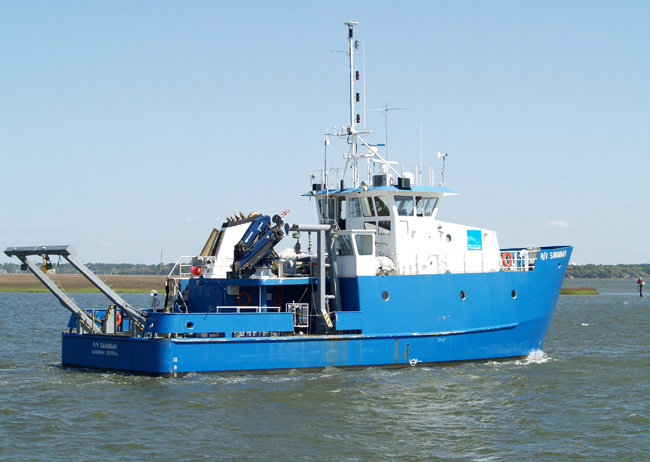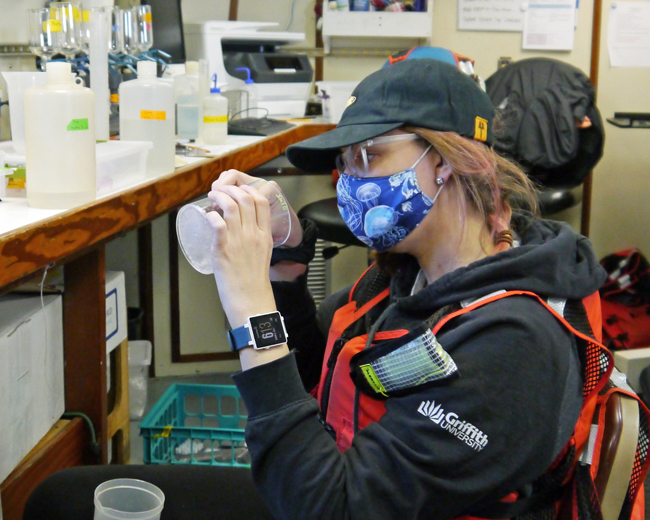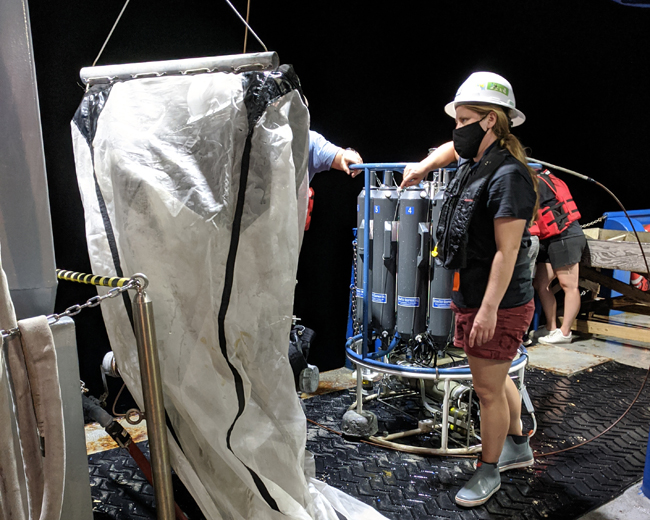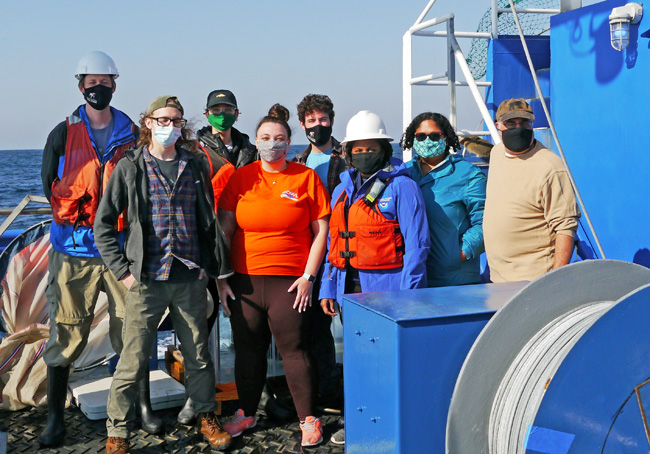The COVID-19 pandemic threw a gigantic monkey wrench into John Bichy’s plans and expectations for a successful year for the University of Georgia Skidaway Institute of Oceanography’s Research Vessel Savannah. As marine superintendent, Bichy is responsible for scheduling and managing the 92-foot long research ship. The RV Savannah is used by UGA Skidaway Institute scientists, as well as scientists from around the world, to conduct marine research in a range from Chesapeake Bay to the western Gulf of Mexico. In mid-March 2020, the RV Savannah had just completed a lengthy maintenance overhaul and was ready to launch a heavy schedule of research cruises.

The RV Savannah leaving the UGA Skidaway Institute dock.
“We had a solid year planned with 157 cruise days funded, which is basically right at our optimal year in terms of number of cruise days,” Bichy said.
The RV Savannah completed only 13 of those days before March 16, when all operations were shut down.
“The ship was docked and the crew sent home,” Bichy said.
Bichy and his team, which included RV Savannah captain T.J. Dodge, began working with the University National Oceanography Laboratory system (UNOLS) to develop protocols to allow cruises to resume at some point in the future. UNOLS is a National Science Foundation organization that coordinates the nation’s academic research fleet, of which the RV Savannah is a part. The result was an eleven-page document that outlined strict measures, starting with a risk assessment before the science team ever arrives at the dock. The assessment considers factors such as the travel requirements of science personnel; the minimum number of scientists to effectively complete the mission; pre-cruise isolation limitations; and the cruise duration. The plan also established guidelines on COVID-19 testing, social distancing, mask wearing and disinfection.

UGA Skidaway Institute scientist Laura Treible picks tiny marine animals called copepods for analysis.
“That’s definitely what’s been one of the hardest aspects is just trying to keep everyone as safe as possible when they’re in these confined spaces,” Dodge said. “We’ve definitely put in place as much as we possibly could. We’re constantly taking everyone’s temperature, making sure they wash their hands, and we have hand sanitizer about every ten feet.”
The team had safety protocols in place by June 1, but the science cruises didn’t resume until late September. Although, the Skidaway team was ready to resume cruises earlier, the scientists who schedule the cruises were not as quick to do so.
“The problem was the scientists and their institutions had things on lockdown too,” Bichy said. “Everyone was trying to develop protocols to be safe and protect folks.”
The RV Savannah ended up completing a total of 49 days of science cruises in 2020. In addition, the crew participated in several additional performance cruises.
“They were funded by NSF to keep the crews and the vessels operational,” Bichy said. “They would do safety drills and that kind of thing, so they were essentially training cruises.”
Once cruises resumed, they still differed sharply from pre-COVID-19 trips. The maximum size of the science party was reduced to allow no more than two scientists to share a cabin that would normally have slept three or four. Meals were staggered to allow no more than three people to share a table.
“It’s been a challenge, because people get tired, they get hot,” Dodge said. “It’s hard. I mean, even I forget, ‘oh, my mask, my mask.’ It’s always trying to remember to put your mask on.”

RV Savannah marine technician Morgan Hudgens supervises a night deployment of a plankton net.”
However, Dodge said, he received very few complaints and almost no pushback from the scientists who were using the ship. “They all understood. The all have been going through their own protocols at whatever university they have been working at.”
UGA Skidaway Institute scientist Adam Greer has participated in several cruises under the COVID-19 protocols. He said the restrictions forced the scientists to pay more attention to the little things that, normally, they would give no thought, like wearing masks and being mindful of the number of people gathering in a particular part of the ship. However, he said the overall impact on his work was minimal.
“We were still able to carry out all operations, which mostly involved deploying and recovering instruments,” he said. “The testing requirements and general protocols while on the ship made everyone quite confident that we could keep the virus off the ship and still conduct our scientific operations.”
The COVID-19 restrictions, both from UNOLS and UGA Skidaway Institute, also affected the ship itself, as the crew found it difficult or impossible to perform some essential routine maintenance. The crew was limited to only one two people on board at any time, and they had to distance themselves from each other. Much of the equipment is heavy and more than one person is required in order to work on it. However, the crew could not just dock the ship and walk away.
“This is a ship, and you have to work on it all the time,” Dodge said. “It’s a big piece of steel, sitting in salt water with electricity running through it. So, it needs constant attention.”
The National Science Foundation recognized the need to maintain both the ship and the crew. Normally, the ship’s operating expenses, including crew salaries, are funded from the fees funding agencies like NSF pay to allow scientists to use the ship. However, the RV Savannah did not generate any revenue when it was tied to the dock for six months. NSF provided some supplementary funding to keep the crew employed.

The science team on an April 2021 research cruise.
All the effort paid off. There were no cases of COVID-19 connected to any RV Savannah cruises. As vaccinations become more widespread, Bichy and Dodge expect to make vaccinations a requirement for participation in future cruises. With 179 cruise days on the schedule for 2021, they are optimistic it will be a safe and successful year for the RV Savannah.


